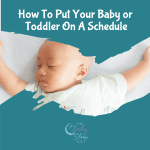
We have a variety of sample baby sleep and feeding schedules, but how do you put your baby on a sleep or nap schedule, anyway? Your strategy for implementing a baby’s nap schedule will depend on the age of your baby. Here are some tips:
4 month old baby
Your 4 month old baby will have limited ability to be on a true by-the-clock schedule. The best way to add predictability and structure to your day is to follow more of a routine rather than a schedule. Your routine may be something like eat-play-sleep, like Babywise, or something unique you create for your unique baby.
Predictability not only helps you plan your day, but it can some babies feel more secure, particularly slow-to-adapt babies. Some babies and parents prefer to follow baby’s cues. Find what works for you and, most importantly, your baby.
5, 6, or 7 month old baby
Between 5 and 7 months old, some babies can begin to get on more of a clock schedule. Usually, at this age, it’s best to have some flexibility in this, though. For example, a 5 to 7 month old may routinely take her nap around 9 a.m., but on a day when she’s working on a developmental leap or is more active, she may need to go to sleep earlier than normal. It’s often best to watch the clock AND your baby, in this age group. To put your 5, 6, or 7 month old on a schedule, you want to move slowly to extend their awake period until your baby can comfortably get to your target nap or sleep schedule.
8, 9 or 10 month old baby
Your 8, 9, or 10 month old can often be on a more regular and predictable schedule. Remember this age group is prone to the 8-9-10 month old sleep regression. For babies sensitive to being over-tired, you probably don’t want to be TOO rigid with your baby’s schedule. Being too rigid may land you into a cycle of chronic over-tiredness, which is sometimes hard to break. And, if bedtime is a little too late, the schedule may work wonderfully for weeks and then BAM, one “off” day sets you into a downward spiral. To put your 8, 9 or 10 month old on a schedule, you’ll want to extend their awake period, just like your 5 or 6 month old, but you may be able to go a bit faster.
11 or 12 month old baby
Your 11 or 12 month old will likely have gotten on their own schedule, even if you didn’t mean for it to happen. Most babies will begin to fall into a fairly regular pattern, even if it’s not identical every day. Inconsistent babies tend to start “smoothing” out at this age, even if they aren’t strictly “consistent.”
If you are still napping and setting bedtime based on sleepy cues, you may feel frustrated if your baby/toddler is not napping long enough and still catnapping during the day. Some babies are “good” about sleepy cues and sleeping well based on them, while others need more structure and direction from you. Not enough awake time can wreak havoc in this age group.
To put your baby/toddler on a nap sleep schedule, take one for a test drive to see how your little one responds. Different babies need different schedules. That’s why we offer a wide variety of sample schedules in our Mastering Naps and Schedules book.
Toddlers
Of all age groups, a toddler’s schedule is often one of the easiest to achieve. As long as your toddler is napping independently and can nap long enough, they will fall into a predictable schedule. You can set the schedule based on the clock and, generally, will get a good night’s sleep and a good nap. Granted, over-tiredness can still lead to shorter naps or night-waking or your baby waking too early. But, if you follow a standard 5 hours awake before and after the nap, most toddlers should do pretty well.
Summing Up Schedules
I hope these tips will help you put your baby or toddler on a nap / sleep schedule. All babies are different and some will be able to get on a schedule earlier than others. My first didn’t get “good” at a schedule until 7 months old while his younger brother was on a schedule around 6 months old. I have seen some 6 month olds take just two naps and I’ve seen 11 month olds taking three naps, which is rare. Having a “wrong” schedule for your baby can impact how long their naps are, how well they sleep at night, what time they wake in the morning, whether they are awake a long time at night, and how fussy or happy they are during the day. Even if you don’t believe in rigid schedules, following guidelines can help, if your baby has sleep problems.
Still Struggling?
If you’re looking for ways to get your baby or toddler into a healthy sleeping routine during the day, I encourage you to explore Mastering Naps and Schedules, a comprehensive guide to napping routines, nap transitions, and all the other important “how-tos” of good baby sleep. With over 40 sample sleep schedules and planning worksheets,
Mastering Naps and Schedules is a hands-on tool ideal for any parenting style. For those persistent nighttime struggles, check out The 3 Step System to Help Your Baby Sleep. Using the same unique approach and practical tools for success, this e-book helps you and your baby sleep through the night. For those looking for a more customized solution for your unique situation with support along the way, please consider one-on-one baby and toddler sleep consultations, where you will receive a Personalized Sleep Plan® you can feel good about! Sometimes it’s not that you can’t make a plan. Sometimes you’re just too tired to.
FREE Custom Baby & Toddler Sleep Schedule Generator
Input your baby’s wake-up time and get a free custom schedule for the day!
.








